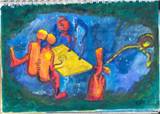Body and Education in Nietzsche. Pedagogical characters as mechanism of transformation
DOI:
https://doi.org/10.17533/udea.efyd.11312Keywords:
Body, education, pedagogical cha- racters, taste education.Abstract
The aim of this paper is to interpret the concept of body and education in the work of Nietzsche for a Body Education in light of Pedagogical An thropology. The approach is hermeneutical and theoretical-documentary. As a result, it appears that the body is the theme of the interpretations, a field of competitive forces that struggle for the preservation or creation of new values. From a critical perspective, education is understood as bodily strength leveling sponsored by the belief in absolute truth. From one perspective, yes, education transforms the body while providing many opportunities for liaison with elements of both culture and nature, spreading a fixed idea of man. Furthermore, we interpret the idea of taste as a way of interaction of the body with the world, through the opening and self-defense as each perception may strengthen or weaken. The taste, unlike Kant, is concerned, which implies a radical critique of the distinction between art, science and morality raised in the Critique of Judgement. The investigation can be concluded that an educational strategy is the construction and testing of pedagogical characters that expand / update the limits set by the logic of identity.
Downloads
References
Bourdieu, P. (1998). La distinción. Criterios y bases sociales del gusto. Madrid: Taurus.
Bozal, V. (1999). El gusto. Madrid: Visor.
Calvino, I. (1989). Seis propuestas para el próximo milenio. (Trad. Aurora Bernárdez). Madrid: Siruela.
De Santiago, L. (2004). Arte y poder. Aproximación a la estética de Nietzsche. España: Trotta.
Deleuze, G., & Guattari, F. (1994). Qué es la filosofía (Trad. Thomas Kauf). Barcelona: Anagrama.
Gevaert, J. (2005). El problema del hombre. Introducción a la antropología filosófica. Salamanca: España.
Jara, J. (1998). Nietzsche, un pensador póstumo. El cuerpo como centro de gravedad. Chile: Anthropos.
Jaspers, K. (2003). Nietzsche. Introducción a la comprensión de su filosofar. (Trad. E. Estiú). Buenos Aires, Argentina: Suramericana.
Kant, I. (1992). Crítica de la facultad de juzgar. (Trad. Pablo Oyarzún). Caracas: Monteávila editores.
Nietzsche, F. (1978). Así habló Zaratustra (Trad. Andrés Sánchez pascual). España: Alianza Editorial.
Nietzsche, F. (1980). Sobre el porvenir de nuestras escuelas (Trad. Carlos Manzano). Barcelona: Tusquets Editores.
Nietzsche, F. (1992). Fragmentos póstumos. (Trad. Germán Meléndez Acuña). Bogotá: Norma.
Nietzsche, F. (1997). Más allá del bien y del mal. Madrid: Alianza Editorial.
Nietzsche, F. (2000). El nacimiento de la tragedia. Grecia y el pesimismo. (Trad. Andrés Sánchez Pascual). Madrid: Alianza Editorial.
Nietzsche, F. (2000a). Schopenhauer como educador. Madrid: Biblioteca Nueva.
Nietzsche, F. (2001). La gaya ciencia (Trad. Pedro González Blanco). México: Editores Mexicanos Unidos, S.A.
Nietzsche, F. (2005). El caminante y su sombra. España: Edimat Libros.
Nietzsche, F. (2007). La voluntad de poder. Madrid: Edaf.
Puelles, L. (2000). Voluntad de crear. Nietzsche o el arte contra la estética. Recuperado el 17 de enero de 2011http://www.uma.es/contrastes/pdfs/005/Contrastes005-18.pdf.











